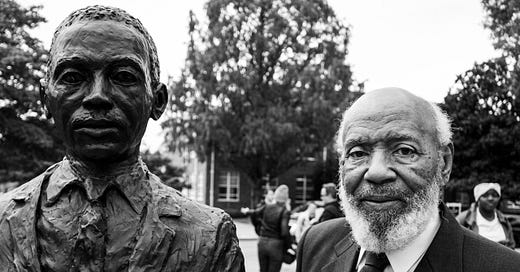In October 1962, James Meredith, a twenty-nine-year-old Air Force veteran enrolled at the University of Mississippi, accompanied by federal marshals and the National Guard. There were riots, injuries, and deaths. He became the first Negro (his term) to study at Ole Miss.
Four years later, Meredith planned a March Against Fear, in which he would walk alone from Memphis, Tennessee, to Jackson, Mississippi, a demonstration against racism and in support of the Voting Rights Act of 1965. On the second day, he was shot and wounded by a white gunman. After his recovery, he resumed the march, and when he arrived in Jackson on June 26, 1966, he was accompanied by about 15,000 people, a signature event in that era.
I had met Meredith in February 1962, as a college sophomore on a visit to Mississippi arranged by Bill Higgs, a young white lawyer who was handling civil rights cases. I asked Meredith to write an article for the Justice, the Brandeis University newspaper. And on March 12, he mailed me a a three and a half page single spaced letter which is in his extensive files at the University of Mississippi archives . On October 2, the letter was published in the Justice under the headline, The Southern Negro: His Hope for the Future. He has authorized a posting of the letter pending release by` Ole Miss’.
Meredith is about to be ninety. He lives in a cozy house that has seen better days in a quiet Jackson neighborhood, accompanied by his wife of forty-one years, Judy, and surrounded by memorabilia of his remarkable life. He receives a stream of visitors with whom he eloquently shares his views on race, power, and God, reflecting his messianic convictions.
I spent a morning with Meredith last month, joined by my wife, Susan, and Mary Margaret White, the CEO of Mississippi Today, a nonprofit news organization founded in 2015 that covers the state with energy and investigative success and offers its reporting free to all the other news outlets in Mississippi. In two hours of banter, including some critical jousts with his visitors, particularly me, we learned that Meredith’s views of America today are very much the same as they were sixty years ago.
“The efforts presently made by the different groups to increase the Negro vote by eliminating discrimination,” he wrote in his letter, “will not in my opinion result in any substantial political power for the Negro. However, it may, hopefully, awaken the Negro to the task of securing these privileges and rights for himself. But as for legislative acts, court orders or even police coercion as a method of securing for a people the elements of political power (voting in America), it is, in my opinion, to no avail.”
In short, Meredith believed then and very much still believes today that African Americans, a term he does not use, cannot expect to achieve goals of equality and justice from the white community, even from people of good will.
“I feel that we will have to find a formula that will permit the Negro to gain pride and dignity. And yet leave whites with an assurance their security will not be jeopardized,” he wrote.
In today’s Mississippi, Blacks are about 40 percent of the population of 2.9 million (including those of mixed race) and have a measure of political power. The most prominent Black political leaders are Chokwe Antar Lumumba, the mayor of Jackson, who was thirty-four when he was elected in 2017 to lead his majority Black city, and Democratic Congressman Bennie Thompson, who represents the state’s second congressional district (and was the much-admired chair of the House’s select committee on the January 6 insurrection). But the state’s executive and legislature are Republican-controlled and white-dominated, with consequences that, in Meredith’s view -- and he is far from alone -- limit the influence and progress of the state’s Black citizens.
Meredith’s stature in the state is complicated by his instincts as a contrarian. He ran for office as a Republican and once worked in the U.S. Senate for Jesse Helms of North Carolina, an avowedly right-wing politician, a pillar of white power extending beyond the century of Jim Crow discrimination.
By his own account, Meredith’s instincts for those positions were somewhat subversive. When Representative John Bell Williams ran for governor of Mississippi as a Democrat in 1967, Meredith supported the avowed segregationist former Governor Ross Barnett. Why? Because, he told us, by doing that Barnett would likely lose to Williams, and he did.
Williams accepted the federal mandates to end segregation in education.
Meredith’s clarity of mission to this day is to end white supremacy. But he is not an integrationist in the sense that it has been understood since the days of the great civil rights leaders like Martin Luther King Jr. It is the responsibility of Blacks, he says, to devise and implement their own means to gaining power and to fulfill their objectives of the economic and political roles that are rightfully theirs.
When it was time for us to leave, Meredith was still very much engaged and animated. We shook hands warmly, but James Meredith never was and is not now a gladhander. But as he demonstrated in 1962, and continuing to this day, he has a vision for what he wants his racial brethren to achieve and will persist until his very last breath – which based on the time we spent with him is not in prospect.






